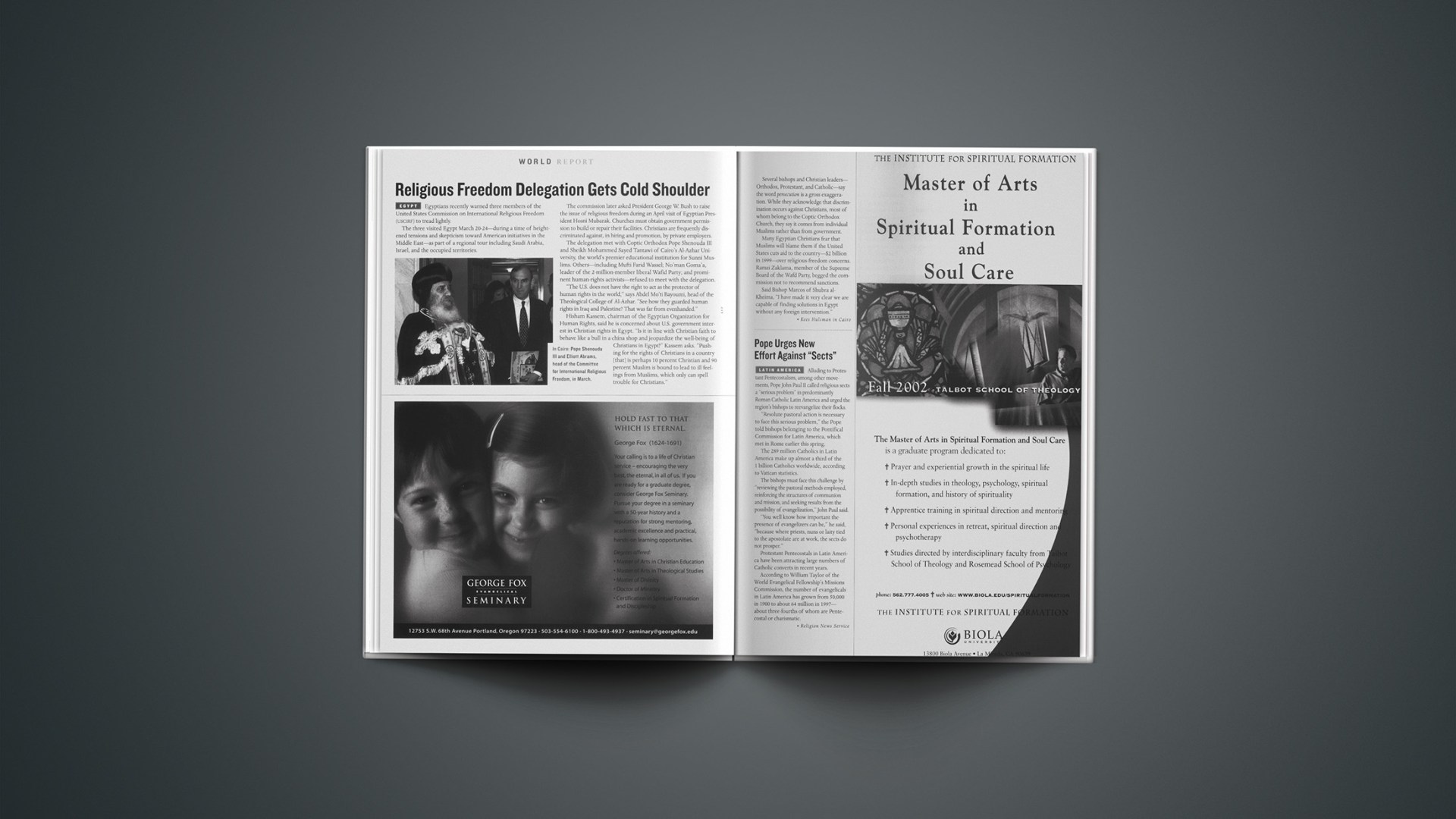The three visited Egypt March 20-24—during a time of heightened tensions and skepticism toward American initiatives in the Middle East—as part of a regional tour including Saudi Arabia, Israel, and the occupied territories.
The commission later asked President George W. Bush to raise the issue of religious freedom during an April visit of Egyptian President Hosni Mubarak. Churches must obtain government permission to build or repair their facilities. Christians are frequently discriminated against, in hiring and promotion, by private employers.
The delegation met with Coptic Orthodox Pope Shenouda III and Sheikh Mohammed Sayed Tantawi of Cairo’s Al-Azhar University, the world’s premier educational institution for Sunni Muslims. Others—including Mufti Farid Wassel; No’man Goma’a, leader of the 2-million-member liberal Wafid Party; and prominent human-rights activists—refused to meet with the delegation.
“The U.S. does not have the right to act as the protector of human rights in the world,” says Abdel Mo’ti Bayoumi, head of the Theological College of Al-Azhar. “See how they guarded human rights in Iraq and Palestine? That was far from evenhanded.”
Hisham Kassem, chairman of the Egyptian Organization for Human Rights, said he is concerned about U.S. government interest in Christian rights in Egypt. “Is it in line with Christian faith to behave like a bull in a china shop and jeopardize the well-being of Christians in Egypt?” Kassem asks. “Pushing for the rights of Christians in a country [that] is perhaps 10 percent Christian and 90 percent Muslim is bound to lead to ill feelings from Muslims, which only can spell trouble for Christians.”
Several bishops and Christian leaders—Orthodox, Protestant, and Catholic—say the word persecution is a gross exaggeration. While they acknowledge that discrimination occurs against Christians, most of whom belong to the Coptic Orthodox Church, they say it comes from individual Muslims rather than from government.
Many Egyptian Christians fear that Muslims will blame them if the United States cuts aid to the country—$2 billion in 1999—over religious-freedom concerns. Ramzi Zaklama, member of the Supreme Board of the Wafd Party, begged the commission not to recommend sanctions.
Said Bishop Marcos of Shubra al-Kheima, “I have made it very clear we are capable of finding solutions in Egypt without any foreign intervention.”
Copyright © 2001 Christianity Today. Click for reprint information.
Related Elsewhere
The U.S. Commission on International Religious Freedom has several press releases about the trip:- Delegation from the U.S. Commission on International Religious Freedom Visits Egypt (Mar. 16, 2001)
- Commission Statement on Visit to Cairo, Egypt (Mar. 26, 2001)
- Commission Asks President Bush to Raise Religious-Freedom Issues With Egyptian President Mubarak (Apr. 2, 2001)
The USCIRF’s annual report, released today, noted, “As this report went to press, it was not possible to include here a full review of that trip [to Cairo].” Expect one soon. Meanwhile, the U.S. State Department’s 2000 Human Rights Report (released in February 2001) and 2000 Religious Freedom Report (released in September 2000) are still available.
The BBC also briefly noted the USCIRF delegation’s trip.
Earlier Christianity Today coverage of religious freedom in Egypt includes:
Church of the Martyrs | Copts thrive in the face of bloody carnage, legal restraint, and discrimination. (August 11, 1997)
Egypt Acquits All Muslim Murder Suspects | Judge blames Coptic clergy for inciting El-Kosheh hostilities. (Feb. 7, 2001)
Egyptian Court Releases All 89 El-Kosheh Defendants | Muslim murder suspects all set free without bail. (Dec. 12, 2000)
Egypt Jails Christian for Three Years for ‘Insulting Islam’ | ‘Extremely harsh judgment’ for El-Kosheh Copt to be appealed. (Aug. 9, 2000)
Egyptian Security Police Threaten, Torture Local Christian | Coptic Orthodox layman targeted for alleged evangelism activities.(July 10, 2000)
Egyptian Court Convicts Christian Villager of Murder | Shaiboub Arsal Given Maximum 15-Year Sentence. (June 9, 2000)
Family Disputes Coptic Pharmacist’s ‘Conversion’ to Islam | Third alleged conversion reported by Egyptian Christians in El-Fayoum (May 8, 2000)
Egyptian Priest Accused of Attempted Murder | Village cleric charged with ‘provoking violence’ in El-Kosheh (Feb. 11, 2000)
Egypt’s Christians seek answers after deadly riots | At least 21 Christians killed in clash with Muslims (Jan. 13, 2000)
Did Carey Really Deny that Copts Are Persecuted? | Was the Archbishop of Canterbury misquoted? What did he really mean? (Dec. 20, 1999)
New Coptic Church Forcibly Closed (Oct. 5, 1998)
Extremists Kill Coptic Christians (Apr. 28, 1997)










